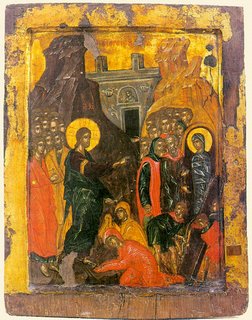
Here's some food for thought during Passiontide.
I was pondering the fact that the Gospel of St. John, ch. 12, gives as the reason for the multitudes of Palm Sunday the fact that Jesus had just raised Lazarus from the dead. This makes sense, of course: the raising of Lazarus was a very public event; he had been dead four days, and now Jesus calls him forth. You can virtually see everyone's jaw drop. So the news would have spread like wildfire. Soon a great crowd comes out, hearing that Jesus is about to enter the city. They want Him to be king; they see Him as the greater Solomon, riding on an ass, even has Solomon had. So they straw palm branches, and they cry out, Hosanna! --which is, Osa na!, that is, "Save, now!" To put it in modern parlance, it would be, "God save the King!" This all fits together in the recollection of the Fourth Evangelist: He raises Lazarus, so He is the one we recognize as our King.
But then why don't the synoptic Gospels mention the raising of Lazarus at all? Such a stunning event as this might have at least garnered a passing mention, don't you think? What's going on? St. Matthew has Jesus referring to the raising of the dead in his reply to John's disciples (11.5), but that's about it.
Well, here's a thought. St. Matthew does refer to this amazing event, but only in the midst of the crucifixion account, chapter 27, in that enigmatic saying about the dead being raised and going into the holy city. Could this be a reference to the raising of Lazarus, displaced by Matthew for theological reasons? And could St. Luke be intentionally leaving it out because it is only in Luke's Gospel that we have Jesus' story of the rich man and "Lazarus" (chapter 16). After all, he does say there that if Dives' brothers will not be persuaded by Moses and the prophets, neither will they be persuaded if one rise from the dead. Interestingly, the story here does not really read like a parable. Could it be an actual event, which Jesus recounts as something that really took place? And that in fact, according to Dives' request, Lazarus did come to them from the dead, and, sure enough, they didn't believe?
So now leave it to John to set the record straight for posterity. While Matthew and Luke leave the matter rather open, even though for their audiences, everyone knew about Lazarus, St. John, writing a generation later, must make crystal clear what actually took place concerning Lazarus; hence his account in his eleventh chapter.





No comments:
Post a Comment